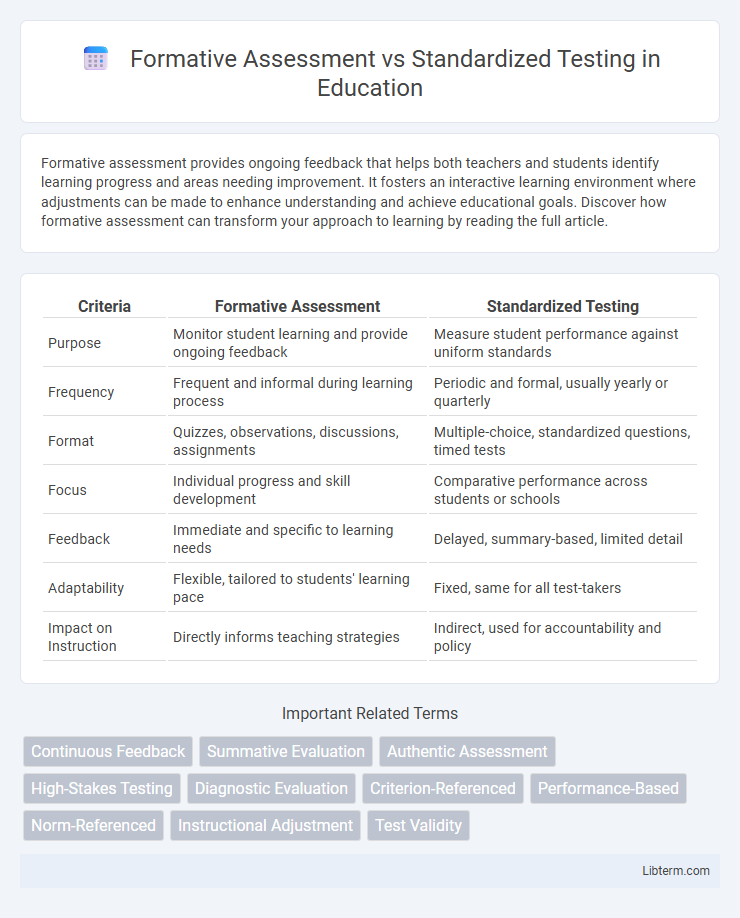Formative assessment provides ongoing feedback that helps both teachers and students identify learning progress and areas needing improvement. It fosters an interactive learning environment where adjustments can be made to enhance understanding and achieve educational goals. Discover how formative assessment can transform your approach to learning by reading the full article.
Table of Comparison
| Criteria | Formative Assessment | Standardized Testing |
|---|---|---|
| Purpose | Monitor student learning and provide ongoing feedback | Measure student performance against uniform standards |
| Frequency | Frequent and informal during learning process | Periodic and formal, usually yearly or quarterly |
| Format | Quizzes, observations, discussions, assignments | Multiple-choice, standardized questions, timed tests |
| Focus | Individual progress and skill development | Comparative performance across students or schools |
| Feedback | Immediate and specific to learning needs | Delayed, summary-based, limited detail |
| Adaptability | Flexible, tailored to students' learning pace | Fixed, same for all test-takers |
| Impact on Instruction | Directly informs teaching strategies | Indirect, used for accountability and policy |
Understanding Formative Assessment
Formative assessment is a continuous evaluation process that provides immediate feedback to both teachers and students, allowing for real-time adjustments in instruction and learning strategies. It emphasizes student understanding and skill development through informal methods such as quizzes, discussions, and observations, rather than relying on high-stakes testing. Unlike standardized testing, which measures proficiency at a single point in time, formative assessment supports personalized learning and ongoing growth.
What Are Standardized Tests?
Standardized tests are assessments administered and scored in a consistent manner to ensure comparability across different test-takers and locations. These tests typically measure specific academic skills or knowledge, such as math, reading, or science, and are often used for accountability purposes in education systems. Their structured format and uniform scoring allow for benchmarking student performance against predetermined standards or norms.
Key Differences Between Formative and Standardized Testing
Formative assessment involves ongoing evaluations conducted by teachers to provide immediate feedback and adjust instruction based on student progress, enhancing personalized learning experiences. Standardized testing measures student performance against uniform benchmarks through timed, multiple-choice exams, primarily used for accountability and comparison across populations. The key differences lie in their purpose, timing, and flexibility: formative assessment is diagnostic and adaptable, while standardized testing is summative, rigid, and used for large-scale evaluation.
Purposes and Goals of Each Assessment Type
Formative assessment aims to monitor student learning and provide ongoing feedback to improve instruction and student performance, focusing on identifying strengths and areas for growth in real-time. Standardized testing evaluates student achievement against uniform benchmarks or standards, primarily serving accountability purposes and comparing performance across populations. The goal of formative assessment is to support personalized learning and skill development, while standardized testing seeks to measure educational outcomes and ensure consistency in academic standards.
Benefits of Formative Assessment
Formative assessment enhances student learning by providing timely feedback that guides instructional adjustments and supports personalized learning paths. It fosters critical thinking and skill development through continuous, interactive evaluation rather than one-time high-stakes testing. Research shows that students engaged in formative assessments demonstrate higher achievement and greater motivation compared to those assessed solely by standardized tests.
Limitations of Standardized Testing
Standardized testing often fails to capture individual learning styles, critical thinking, and creativity, limiting its ability to provide a comprehensive evaluation of student abilities. The rigid format can induce test anxiety and does not accommodate diverse cultural or linguistic backgrounds, resulting in biased outcomes. Furthermore, standardized tests emphasize rote memorization over deeper understanding, which can hinder effective teaching and learning processes.
Impact on Student Learning and Motivation
Formative assessment promotes continuous feedback, enabling personalized learning adjustments that enhance student understanding and engagement, leading to increased motivation and academic growth. Standardized testing often emphasizes performance rankings and summative evaluation, which can induce stress and reduce intrinsic motivation, potentially hindering long-term learning. Research indicates that formative approaches foster deeper comprehension and sustained enthusiasm, while standardized testing primarily measures achievement without directly supporting day-to-day learning processes.
Role of Teachers in Assessment Processes
Teachers play a crucial role in formative assessment by providing real-time feedback that guides student learning and instructional adjustments. Unlike standardized testing, which offers a summative snapshot of student performance, formative assessments empower educators to identify individual strengths and weaknesses during the learning process. This ongoing evaluation enhances personalized teaching strategies and improves overall student outcomes.
How Assessment Types Influence Curriculum
Formative assessment drives curriculum flexibility by providing ongoing feedback that informs instructional adjustments and personalized learning paths. Standardized testing emphasizes uniformity and accountability, often leading to a narrowed curriculum focused on testable content and skill mastery. The contrasting purposes of these assessments shape curriculum design through either adaptive learning strategies or standardized benchmarks.
Future Trends in Educational Assessment
Future trends in educational assessment emphasize the integration of formative assessments with advanced technology, enabling real-time data analytics to personalize learning pathways and improve student outcomes. Adaptive testing systems, driven by artificial intelligence, are refining both formative and standardized testing to provide accurate, individualized feedback while reducing test anxiety. The shift towards competency-based evaluation and continuous monitoring is reshaping assessment frameworks to support lifelong learning and skills mastery in diverse educational settings.
Formative Assessment Infographic

 libterm.com
libterm.com